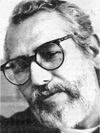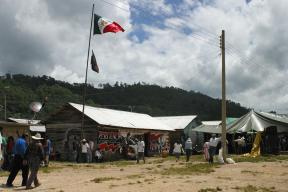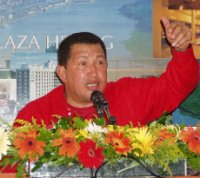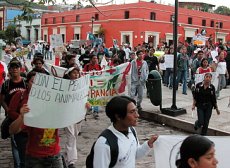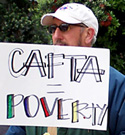Feature Archives
17 October 2005: The U'wa people of northeast Colombia have again rejected the extraction of oil from their cloudforest home and refused to participate further in a "Prior Consultation" process to legitimize the process. The project in question is the Siriri oil block, abandoned by California multinational Occidental Petroleum under sustained pressure from the U'wa, campesinos and international supporters. The block is now being explored by the Colombian state firm Ecopetrol, with the assistance of Spanish multinational Repsol. When government representatives helicoptered in to U'wa territory on September 28, they were met by a clear rejection from the U'wa traditional government, which vowed never to allow oil drilling.
As part of a speaking tour across the United States, two representatives of the U'wa people visited the Bay Area October 10-16 to speak out against renewed oil drilling attempts in their territory. U'wa international representative and community organizer Daris Cristancho expressed her communities defiance against government threats to cut off social spending if the U'was do not permit drilling: "The laws of the U'wa do not change as the laws of the government do... We would rather live dignified lives deep in the mountains than be bribed [in exchange for drilling]."
[U'wa Website (es) | Amazon Watch: U’wa Grassroots Leaders Speaking Tour and Background on Siriri Oil Project | Colombia Indymedia U'was rompen silencio y dicen No]
On September 23rd, Filiberto Ojeda Ríos and his wife were alone in their home when they were shot at over 100 times. Ojeda Ríos was hit in the shoulder on Friday afternoon. Law enforcement waited 20 hours before entering the house, and found him dead. Autopsy reports show that he had bled to death from the wound in his shoulder.
The killing of Ojeda Ríos added insult to injury for Puerto Ricans, who are fighting for indepdendence from the United States. He was killed on the anniversary of the Grito de Lares, which is considered to have been the launching point of Puerto Rican nationalism, and is a national holiday. On September 23rd, 1868 between 600 and 1000 men, mostly Puerto Rican born, revolted for independence from Spain. They managed to take Lares without any resistance before the Spaniards became aware if the revolt. They set up a provisional government and declared an independent Puerto Rico Republic. The following day they marched to San Sebastián, where the Spanish militia defeated them. 20 of the indepedentistas escaped, 8 died in action, 7 were tried by the War Council. Four months later Spain declared a general amnesty. No one was executed or kept in jail over 4 months, but 80 had died in jail from yellow fever. Read more Filiberto Ojeda Ríos had released statements every year on the Grito de Lares. Protests have been held in Puerto Rico and US cities such as New York.
Indymedia Puerto Rico | Indymedia.org story About Filiberto Ojeda Ríos | Democracy Now report from 9/29 | Between the Lines interview with Jorge Farinacci | WSWS Article | ProLibertad Freedom Campaign | Article from Movimiento Socialista de Trabajadores | Claridad, Newspaper in PR | Macheteros website
Called by the Zapatista Army of National Liberation, thousands have been attending a series of meetings in Chiapas, including collectives, artistic groups and NGO's. Presentations have ranged from dry readings to hip-hop performances and lottery games.
Subcomadante Marcos announced "The Other Campaign" in the Sixth Declaration from the Lacandon Jungle, a non-electoral alternative to election-year politics.
The Sixth Declaration marks a divergence in Zapatista history. While the rebel organization has always called for national and international solidarity, it has limited its objectives to those defined by the indigenous struggle. With this declaration their goals have expanded to the recreation the left and the definition of a new constitution.
Having been trodden by political parties on the left and right, the indigenous of Chiapas, and autonomists throughout Mexico, are saying that there can be no electoral alternative. Following the Sixth Declaration, Marcos released a series of heavy critiques of the Partido Revolucion Democratica (PRD), Lopez Obrador, probable presidential candidate of the same party, and electoral politics in general, cleanly pushing politicians to the margins of the Other Campaign.
The mass media, including the national, and supposedly leftist paper, La Jornada, quickly demonstrated their allegiance by defending status quo politics and the PRD's candidate.
This weekend's meeting represents the conclusion of the initial phase of the Other Campaign. Full coverage at Indymedia Chiapas | Live radio
Democracy Now | U.S. Hands Off Venezuela Campaign | revolutionaries and a country on the edge
While constantly referred to in the US media as a dictator, Hugo Chávez was elected President of Venezuela in 1998 with the largest percentage of the vote received by any Venezuelan leader in decades. After taking office, Chávez embarked on a series of sweeping changes to the Venezuelan government, using referendums to restructure the government and pass a new Constitution.
On April 9, 2002, Venezuela's largest union federation, the Confederación de Trabajadores de Venezuela (CTV) backed by the US based AFL-CIO, called for a two-day general strike. This may have been in response to Chávez's having forced the unions to hold new elections of the leadership amid fraud allegations. The Venezuelan Federation of Chambers of Commerce joined the strike and called on all of its affiliated businesses to close for 48 hours. On Thursday, April 11, an estimated half million people marched to the headquarters of Venezuela's oil company, PDVSA, in defense of its fired management. After violence erupted at the demonstration and 17 people were killed, Commander-in-chief Lucas Rincón Romero announced in a national broadcast that Chávez had resigned. The President of the Chambers of Commerce, Pedro Carmona Estanga, appointed himself President, dissolved the National Assembly, declared void the 1999 Constitution, and fired the entire Supreme Court. Carmona's installation as President generated a widespread uprising in support of Chávez that was suppressed by the Metropolitan Police. The Presidential Guard – which according to some sources had been strengthened by Chávez in advance after being warned of the rebellion – retook the palace and the rebellion collapsed. During the brief coup, the US was one of the only countries to recognize the new leadership and Chavez has accused the US (and specifically Elliott Abrams and Otto Reich) of being the real force behind his overthrow.
Just months after returning to power, the Chávez government was faced with a strike aimed at forcing the president from office by cutting off the state from all-important oil revenue. In August 2003, opposition leaders began a process to recall Chávez, a procedure first introduced in Venezuela in Chavez's own 1999 constitution. The recall vote was held on August 15, 2004 with a record numbers of voters turning out. 59.25% of the vote was against the recall. Election observers Jimmy Carter of the Carter Center and Organization of American States Secretary General César Gaviria endorsed the results of Venezuela's recall referendum.
Since the referendum Chavez has clashed with the US over his close relations with Cuba and Iran. In July, Chavez and other left-leaning South American leaders launched the Telesur TV network intended to help counteract US propaganda.
Venezuela from Below | Urban Agriculture | Love at first sight with the Venezuelan revolution | Caracas hears the case for Marxism |
Past Indybay Coverage Of Venezuela And Hugo Chavez:
Hands Off Venezuela Meeting in San Francisco | Chavez Speaks at the World Social Forum | Prosecutor in Chávez Coup Inquiry Is Assassinated | Chavez Wins Venezuelan Referendum | AP Leaves Democracy in the Balance as Chavez Averts Coup | Narco News on the Venezuelan Coup, the Media and How to Stop Both of Them | Popular uprising reverses Venezuelan coup
Today is August 19, 2005 and I am in Oaxaca City Mexico, one of the places most visited by tourists in my country. Since last night, the streets have been circled by police of all types; uniformed police, undercover police, military police, police with helmets, wooden batons and gases all to protect the governors from many states in Mexico who were meeting in Oaxaca City.
I was in the Carmen Plaza and I heard whistling and the chants were getting louder, “…education first for the children of the workers, education later for the children of the rich….” I quickly walked to encounter the march of students of the UABJO (Benito Juárez Autonomous University of Oaxaca), youth no older than 25 years that were walking in two lines, in the middle of the march was the students that were carrying large signs accusing the director of the university, Neri, of using Plan Juarez to decrease the quality of the education. Some of the main points of this plan are: privatize the education, increase the tuition, decrease the number of students, eliminate the students´ rights to elect their director, and other such cutbacks in overall quality of the education.
Read More In English And Spanish
CAFTA advocates repeatedly brought up fears of an imminent takeover of Central America by alleged communist forces. “We can send free trade to Central America today, or we will be sending troops tomorrow” was the way they phrased their warnings. Venezuela’s Bolivarian Alternative for the Americas (ALBA) was brought up on the House floor and portrayed as a radical attack on America rather than a political and economic program that embodies a different vision of economic integration for Latin America. The Bush Administration has recently been negotiating the expansion of NAFTA to Colombia, Peru, Ecuador, and Bolivia through the Andean Free Trade Agreement (AFTA). Anti-CAFTA organizers have encouraged opponents of "free trade" to write to Congresspeople to let them know if they approved or disapproved of their CAFTA votes.
Democracy Sold Out- CAFTA Approved by Pork and a Hill of Beans, by Deborah James | Read more about CAFTA on Indybay's Global Justice News Page



